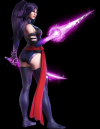Lofgeornost
Feeling Martian!
- Joined
- Jul 8, 2020
- Messages
- 3,461
- Reaction score
- 10,449
The '70s was recent! Yay! I'm a spring chicken! As noted above: The Deryni novels began before D&D and as mentioned above had psionics and magic and Marion Zimmer Bradley's (gag) Darkover had psi, but not magic it was from the early '70s as well. I don't recall Pern's Dragonriders abilities, but I think they were Psi, although admittedly Darkover and Pern have sort of "humans on a new planet, find psychic powers" after being stranded. So eh? Maybe SF, but the first book I read of MZB's was not one I'd have called SF. I wish I'd stopped there but I was a kid at the time. I'm trying to remember if Witchworld has psi, I don't believe so, but my memory of those is dimmer.
FWIW, you can push this back earlier than the 1970s; it seems to have been a fairly common trend among some writers decades before that. For instance, Poul Anderson's "Witch of the Demon Seas," (1951) is a sword-and-sorcery tale that reads a bit like Conan, but 'magic' in the story turns out to be mental powers (illusion and mind control). In Henry Kuttner's Mask of Circe (1948) magic is super-science and mental powers, and the Greek gods themselves are very powerful mutant humans (or, in one case, an A.I.). In Kuttner's Land of the Earthquake (1947), magicians do various mental tricks (mind control, telepathy, clairvoyance, etc.) but also create more obviously magical effects, like a cage of fire used to imprison someone, producing food and water magically, and physically splitting someone into a good and evil set of twins (rather like the Star Trek episode).
This isn't what you are talking about, I know, but my guess is that it would not be hard to find both psionic-like mental powers and magic in pulp adventure stories with a (then) contemporary setting, like Doc Savage. That's another genre of game where I wouldn't mind having both magic and psionics.





